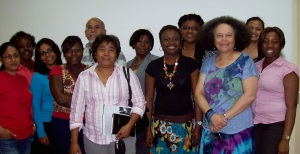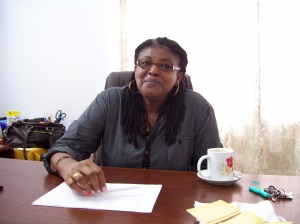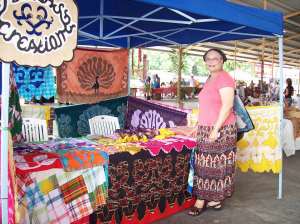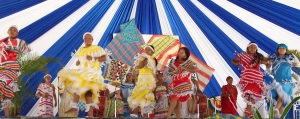Feminist Pedagogy
REFLECTIONS FOR REVISIONINGS:
AN ENCOUNTER WITH EMANCIPATORY METHODOLOGIES
(August 3, 2011)
The Anton de Kom University of Suriname outside of the capital city of Paramaribo has only a minimal number of courses in gender and women’s studies. And none are offered at the graduate level. When word got around that the Institute for Graduate Studies & Research was offering an elective course in July, there was a great deal of enthusiasm. The preliminary course description stimulated interest, so when it was announced that the visiting lecturer would give a public lecture to launch the intensive seminar, word of mouth played a significant role in publicizing the event. The lecture’s title ignited the curiosity of many people who were interested in finding out what the American professor would have to say. “Don’t Throw the Baby out with the Bathwater! Multi-Methodological Dialogue for the Decolonization of Knowledge” was the catchy title that Faye Harrison came up with after Jack Menke asked her if she’d give a lecture. Professor Menke is the sociologist responsible for organizing the year-long research methodology course for master’s students. The course included a few modules that visitors from outside the country had been invited to teach. For instance, in May Tony Whitehead, an anthropology professor at the University of Maryland, College Park (USA), taught a ten-day module on qualitative research with an emphasis on ethnography.
After meeting Faye last summer in Florida, Jack invited her to submit a proposal for a module on feminist research methodology. She’d told him of her interest in the politics of knowledge production and of her background teaching women’s studies research and writing about feminist methodology in anthropology. She kept in contact with him over the following months, exchanging ideas about the prospective seminar’s contents and requirements. Her proposal was eventually approved, and she received an official invitation to visit Suriname. (Scroll down to the earlier post, “Teaching Moments,” below this essay for a description of the seminar with pdfs of the readings assignments.) The best time for her was during the summer, preferably in July, after her trip to South Africa in February and March, Cuba in May, and then two doctoral dissertation defenses scheduled in June. The last two weeks in July were free.
Only a couple weeks before she was scheduled to leave, Jack suggested that Faye launch her seminar with a public lecture. Although she was already pushing herself to prepare for the seminar, she couldn’t say no to the lecture. This would give her a chance to address an audience broader than the students enrolled in the course. She had to make the talk interesting and accessible enough to captivate the audience’s attention. She wasn’t sure who would be there. Mainly university students and faculty? Or would community people also attend? Perhaps Paramaribo’s women’s organizations would be represented? She didn’t know whether there’d be five, fifty, or a hundred and fifty there, but she prepared a “script” she could perform, with the visual aid of colorful power point slides. The lecture was to be an overview of the seminar, featuring its major highlights, authors, and how the several readings the seminar would be organized around related to the real world of women’s lives and struggles in the early 21st century.
The lecture turned out to be a success, as was the seminar that followed it. The medium-sized auditorium in the Institute for Graduate Studies & Research was full. The discussion following the lecture was dynamic, propelled by a series of excellent questions that enabled Faye to elaborate on summary points made during the lecture and in the accompanying slides. Both men and women were in attendance, academics and practitioners in Paramaribo’s civil society, especially its women’s organizations.
Sixteen individuals signed up for the seminar, about half as observers. The roster of the thirteen who attended most of the sessions included the director and two staff members of the National Women’s Movement (Nationale Vrouwen Beweging), a representative of the UN Population Fund (UNFPA) in Suriname, the director of the Faculty of the Social Sciences at the university, the director of educational services at the Suriname Museum Foundation, a social worker in public health, a high school history teacher, and a sociologist working as a university lecturer and consultant. There were also students studying toward degrees in sociology, economics, and history. When asked why they were there, why they decided to take the course, most responded that the seminar presented an opportunity for them to extend their knowledge of feminist and indigenous approaches to knowledge and to reflect critically on their interests and work as students, scholars, and practitioners. They welcomed the seminar in hopes that they’d be able to assess where they were and where they needed to go as participants in Suriname’s women’s movement and/or in the country’s civil society in general. Most were interested in learning more about feminist theory and methodology, but there were others who were curious about indigenous methodology, whether it could be relevant to their academic or practical work with indigenous communities in Suriname.
The seminar’s daily sessions, including on Saturday, were four hours each. Everyone, including the facilitator, had to work hard in order to prepare for the presentations, discussions, and the break-out group excercise toward the end of the course. The discussions were always lively and rich with information on Suriname’s particularities as compared with the cases that the readings addressed in the other parts of the Caribbean, Africa, and North America.

While Mirella Nankoe tkaes notes, sociologist Julia Terborg explains an author's argument on the contradictions and complications of collaborative research.
From her initial exchanges with Jack, Faye was excited about giving the seminar in good part because she expected to learn as much from the students as they would learn from her. And that’s exactly what happened. How could it not with the remarkable synergy the seminar engendered? Each of the students brought something special to the seminar. Rayah Bhattacharji’s involvement in a national NGO for women and development, Projekta Foundation (Stichting Projeckta), Gracita Groenefelt’s master’s thesis on the controversial popular cultural expressions of kabula (parallel in many respects with the “slackness” of Jamaican dancehall), Randy van Zichem’s work in sustainable development and education, Tieneke Sumter’s experience as a social worker and feminist activist in the Netherlands before returning home to Suriname, and Judith Brielle’s work with the UN’s Fund for Population were just some examples of the diverse lived experiences and professional competencies that inform our critical assessment of the reading assignments.
During the last evening meeting of the course, some of the students claimed that the seminar had actually exceeded their expectations. They all agreed that it had stimulated their thinking in new directions. Tieneke suggested that they continue their conversations on a more informal basis. There wasn’t sufficient time to read most of the material as closely as needed, so why not read them together, meeting perhaps once a week or twice a month to discuss them? Genia interjected that she’d like to see them collaborate on an action project and not restrict themselves to reflecting on texts without following up on their talk with collective action. Both the study group (consciousness raising) and the action plan ideas were consistent with much of literature examined in the seminar. The methodologies examined tended to emphasize participatory, collaborative work directed toward social emancipation and an alternative knowledge transcending the limits of northern epistemologies.
Faye’s time in Suriname was largely based at the university and its environs. Nonetheless, she did manage to catch some instructive glimpses of a cross-section of this multi-ethnic Caribbean and South American society where Afro-Surinamese Creoles, Javanese, Hindustani (Indian), Maroons (Saramaka, Paramaka, Ndyuka, etc.), Indigenous (Amerindian), and small minorities of Euro-Surinamese and mixed-heritage people live, more or less, side by side without the friction found in many other parts of the world.
Having the current director of the National Women’s Movement in the class was a treat. Given Faye’s interest in women’s agency and feminist politics, she visited this organization’s headquarters and learned a great deal about the important work it has done over the duration of its existence. Women’s constituencies from all the country’s ethnic groups have benefited from its development and capacity building projects, both along the coast, where the majority of the population is concentrated, and in the interior where many Maroons and Indigenous peoples live.
***
TEACHING MOMENTS
(June 15, 2011)
After a year’s leave from her regular position, Faye Harrison will be resuming her teaching responsibilities in the fall, when she’s scheduled to offer an undergraduate course, “The African Diaspora,” and a graduate seminar, “Race & Racism in Anthropological Theory.” She will have more to say about those courses later, but right now she’s preparing to give an intensive one-week module in a year-long course on social science research methods at the University of Suriname. Her module will be focused on “Feminist, Indigenous, & Related Critical Methodologies.” The basic course objectives are described below along with the readings, available in pdf format (see links below) for students in Suriname as well as others interested in exploring these philosophies of social inquiry and decolonizing practices of knowledge production.
FEMINIST, INDIGENOUS, & RELATED CRITICAL METHODOLOGIES
I. Objectives: To provide an intensive overview of some of the current debates and trends in feminist and related critical streams of research and knowledge production; to shed light on ways that feminist methodologies intersect with critical race theory and with indigenous, postcolonial and subaltern studies; to examine the ways that feminist and allied researchers approach qualitative research, particularly the repertoire of methods comprising ethnography; to situate Caribbean feminist research within a context of a world social science, structured by knowledge gaps and critically informed by diverse voices, particularly those from the Global South and decolonizing zones of knowledge in the North Atlantic; and to reflect on the principles learned in view of research directions in Suriname.
II. Format: The module will have a combined lecture/seminar format, whereby students must keep up with the readings (some of which will be assigned to specific teams or work groups) and be prepared to discuss the readings in general discussion, smaller break-out groups, or as co-facilitators (a team of two) for a portion of the sessions. Small groups may also be assigned a hands-on research exercise related to some of the readings.
III. Assignments: Students are required to: 1) keep a journal (a Word document) in which they write their reactions and critical reflections on the readings and, based on these, formulate questions to facilitate the seminar’s discussions (30% of grade); 2) participate in team/group activities, including discussions, sharing responsibility for reading & presenting specific articles, and/or engaging in a rapid research exercise (30%); and 3) write a paper of at least 1500 words that examines a methodological issue relevant to the seminar as it applies to research within the Caribbean or a related “world social science” context (40%, due two months after seminar).
IV. Course materials:
A. First session (Thursday, 07/21/11): Public lecture, “Don’t throw the baby out with the bath water: Multi-methodological dialogues in decolonizing knowledge”
1) Faye V. Harrison. 2007. Feminist Methodology as a tool for ethnograaphic inquiry on globalization. In The Gender of Globalization: Women Navigating Cultural & Economic Marginalities. Nandini Gunewardena & Ann Kingsolver, eds. Santa Fe, New Mexico: School of Advanced Research Press.
B. Second session (Friday, 07/22): General introduction and overview to feminist approaches to knowledge and power
2). Peggy Antrobus. 2004. Feminist activism: The CARICOM experience. In Gender in the 21st Century: Caribbean Perspectives, Visions & Possibilities. Barbara Bailey & Elsa Leo-Rhynie, eds. Kingston: Ian Randle Publishers. CARICOM Feminist Activism
3). Filomina Chioma Steady. 2004. An investigative framework for gender research in Africa in the New Millennium. In African Gender Scholarship: Concepts, Methodologies and Paradigms. Signe Arnfred et al., eds. Council for the Development of Social Science Research in Africa (CODESRIA). Dakar: Senegal. Gender Research in Africa
4). Sandra Harding. 2010. Standpoint methodologies and epistemologies: a logic of scientific inquiry for people. In World Social Science Report: Knowledge Divides. Paris: UNESCO Publishing with International Social Science Council.
Recommended
Donna Haraway. 1988. Situated Knowledges: The Science Question in Feminism & the Privilege of Partial Perspective. Feminist Studies 14(3): 575-599.
Nancy Naples. 2003. Epistemology, Feminist Methodology, and the Politics of Method. In Feminism and Method: Ethnography, Discourse Analysis & Activist Research. New York: Routledge. Politics of Method
—— Standpoint Epistemology: Explaining Multiple Dimensions. In Feminism and Method. Standpoint Epistemology
Oyeronke Oyewumi. 2004. Conceptualizing gender: Eurocentric foundations of feminist concepts and the challenge of African epistemologies. In Signe Arnfred et al., 2004. African Gender Scholarship:Concepts, Methodologies and Paradigms. Council for the Development of Social Science Research in Africa (CODSRIA). Dakar:Senegal. Gender as Eurocentric
Bibi Bakare-Yusuf. 2004. “Yorubas don’t do gender”: A critical review of Oyeronke Oyewumi’s The Invetion of Women: Making an African Sense of Western Gender Discourses. In African Gender Scholarship. Critique of Oyewumi
C. Third session (Saturday, 07/23): Indigenous & related critical methodologies I
5). Linda Tuhiwai Smith. 2005 [1999]. Decolonizing Methodologies: Research and Indigenous Peoples. London: Zed Books Ltd and Dunedin: University of Otago Press.
Ch 6 The Indigenous Peoples’ Project: Setting a New Agenda
Ch 7 Articulating an Indigenous Reserch Agenda
Ch 8 Twenty-five Indigenous Projects
Ch 9 Responding to the Imperative of an Indigenous Agenda: A Case Study of Maori
D. Fourth session (Monday, 07/25): Indigenous & related critical methodologies II
6). Norman K. Denzin, Yvonna S. Lincoln, and Linda Tuhiwai Smith, eds. 2008. Handbook of Critical & Indigenous Methodologies. Sage Publications.
Denzin & Lincoln, Introduction: Critical Methodologies & Indigenous Inquiry, 1-20
Gaile Cannella and Katheryn Manuelito. Feminisms from Unthought Locations: Indigenous Worldviews, Marginalized Feminisms, and Revisioning an Anticolonial Social Science, 45-59
Christopher Dunbar, Jr. Critical Race Theory and Indigenous Methodologies, 85- 99
Radhika Parameswaran. Reading the Visual, Tracking the Global: Postcolonial Feminist Methodology and the Chameleon Codes of Resistance, 407-427
E. Fifth session (Tuesday, 07/26): Participatory activist research
7) Charles R. Hale, ed. 2008. Engaging Contradictions: Theory, Politics, and Methods of Activist Scholarship. Berkeley: University ofCalifornia Press.
Introduction. Charles Hale, pp 1-28
Ch 2 Dani Wadada Nabudere [Uganda]. Research, Activism, and Knowledge Production, 62-87
Ch 7 Samuel Martinez. Making Violence Visible: An Activist Anthropological Approach to Women’s Rights Investigation, 183-209
F. Sixth session (Wednesday, 07/27): Working against epistemic coloniality & toward an emancipatory ecology of knowledges
8). Boaventura de Sousa Santos, ed. 2008. Another Knowledge is Possible: Beyond Northern Epistemologies. London: Verso.
Boaventura de Sousa Santos, João Arriscado Nunes, and Maria Paula Meneses. Introduction: Opening up the Canon of Knowledge and Recognition of Difference, ix-lxii
Arturo Escobar and Mauricio Pardo. Social Movements & Biodiversity on the Pacific Coast of Colombia, 288-314
G. Seventh session (Thursday, 07/28): Situating feminist knowledge in the Caribbean & Caribbean diaspora—a dialogue between ethnography, theory, & method
9). Gina Athena Ulysse. 2007. Downtown Ladies: Informal Commercial Importers, A Haitian Anthropologist, and Self-Making in Jamaica. University of Chicago Press.
Selected excerpts to demonstrate author’s application of a reflexive political economy and autoethnography in investigating Jamaican informal commercial importers (ICIs)
Introduction: Toward a Reflexive Political Economy within a Political Economy of Reflexivity
Ch 2 From Higglering to Informal Commercial Importing
Ch 3 Caribbean Alter(ed)natives
10) Gloria Wekker. 2006. The Politics of Passion: Women’s Sexual Culture in the Afro-Surinamese Diaspora. New York: Columbia University Press.
Selected excerpts to demonstrate author’s “scavenger methodology…committed to a form of social constructionism that deeply takes political economy into account” (71).
Ch 2 Political Economy of Inequality
H. Eighth session (Friday, o7/29): Caribbean feminism in theory, method, & research practice
11) Patricia Mohammed. 1998. Towards Indigenous Feminist Theorizing in the Caribbean.
Feminist Review 59: 6-33 (in special issue, Rethinking Caribbean Difference)
12). Rawwida Baksh-Soodeen 1998. Issues of Difference in Contemporary Caribbean Feminism. Feminist Review 59: 75-85.
13). Rhoda Reddock. 2001. Conceptualizing ‘Difference’ in Caribbean Feminist Theory. In New Caribbean Thought: A Reader. Brian Meeks and Folke Lindahl, eds. Pp. 196-209. Jamaica: The University of the West Indies Press.
14) Violet Eudine Barriteau. 2006. The Relevance of Black Feminist Scholarship: a Caribbean Perspective. Feminist Africa 7:9-31 (in special issue, Diaspora Voices).
15) Jocelyn Massiah. 2004. Feminist Scholarship and Society. In Gender in the 21st Century: Caribbean Perspectives, Visions & Possibilities. Barbara Bailey & Elsa Leo-Rhynie, eds. pp. 5-34. Kingston, Jamaica: Ian Randle Publishers.
ANTICIPATING THE LESSONS TO BE LEARNED
The basic parameters of the course module should be apparent from this preliminary information. After the seminar is actually taught, the instructor will share the lessons she herself learned from having engaged this material with her Surinamese students. As graduate students, they are being trained to undertake a research agenda in a particular Caribbean context that has been shaped by the knowledge divides marking the differential institutionalization and evaluation of world social sciences. Structural disparities, however, never preclude intellectual innovations and interventions. Expect some interesting observations and insights after the instructor returns to her home institution in August and reflects upon her enriching experience in Paramaribo. Until then!









